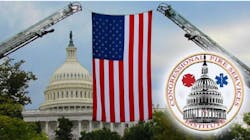Firefighters Cancer Registry to Get $900K Boost
Source Firehouse.com News
Federal lawmakers passed an amendment to add funding to the Centers for Disease Control's Firefighter Cancer Registry
The amendment, which was passed by the U.S. House and backed by Rep. Bill Pascrell Jr. (D-NJ), allocates $900,000 to the CDC to bring funding for the cancer registry to $2.5 million, according to a release by Pascrell. The measure was supported by several fire groups, including the Congressional Fire Services Institute, the Fire Apparatus Manufacturers’ Association, the Fire and Emergency Manufacturers and Services Association, the International Association of Arson Investigators, the International Association of Fire Chiefs, the International Association of Fire Fighters, the International Fire Service Training Association, the International Society of Fire Service Instructors, National Fallen Firefighters Foundation, National Fire Protection Association, and National Volunteer Fire Council.
“For years we sought the creation of a cancer registry so that firefighters who put their lives in danger are protected from some of the deadliest effects of their dangerous work,” Pascrell, the co-chair of the Congressional Fire Services Caucus, said in a statement. “The passage of our bipartisan legislation last year was a gratifying victory for America’s firefighters, but it won’t mean anything if the registry isn’t fully funded. This amendment will ensure that it is, and with it, the Firefighter Cancer Registry can begin collecting the data we need to save lives. I’ll work closely with my Senate partners to make sure full funding is signed into law.”
RELATED:
Under the Firefighter Cancer Registry Act, which was introduced in 2016 and passed in 2018, a registry would contain information showing the incidence of cancer among U.S. firefighters. The registry will:
- collect available cancer incidence data from existing state cancer registries and develop a strategy to maximize participation
- contain relevant history, such as other occupational information, years of service, number of fire incidents responded to and additional risk factors
- make de-identified data available to other health researchers in order to contribute to cancer research
- improve understanding of cancer incidences by requiring administrators to consult regularly with public health experts, clinicians and firefighters.
Last month, the CDC asked for more than 1.1 million firefighters to voluntarily submit health information to help populate the registry.






